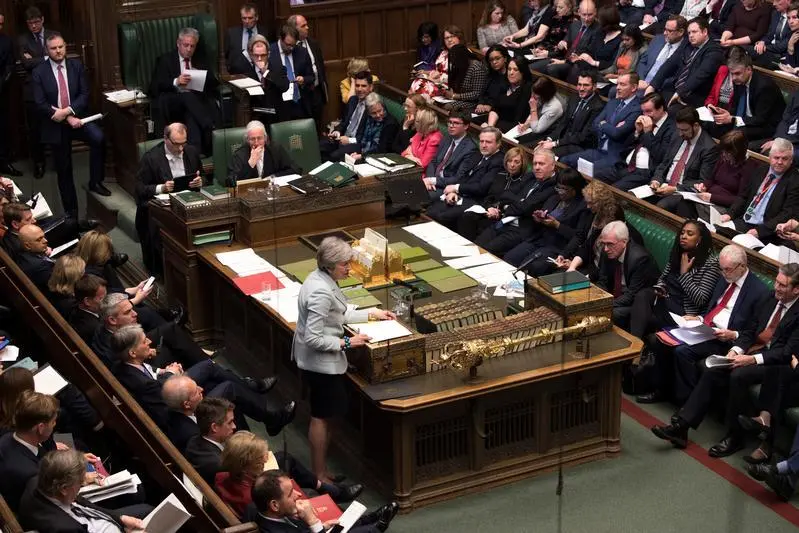PHOTO
LONDON - British lawmakers will on Monday seek to use a vote on the government's next steps on Brexit to wrest control of the process so that they can then try to find a majority for an alternative that would break the parliamentary deadlock.
Britain had been due to leave the European Union on March 29, but after Prime Minister Theresa May's exit deal with Brussels was rejected twice by parliament, she agreed a delay to Brexit in talks with the EU on Thursday.
Now a departure date of May 22 will apply if parliament rallies behind the prime minister and she is able to pass her deal. If she fails, Britain will have until April 12 to offer a new plan or decide to leave the EU without a treaty.
On Monday, May conceded she did not yet have sufficient support in parliament to bring the deal back for a third vote, but said she still hoped to do so this week and was continuing to speak to lawmakers.
Below is what is due to happen in parliament on Monday:
WHAT WILL THEY DEBATE?
Lawmakers are due to debate a government motion saying that parliament has considered a statement made by May on March 15 which set out the government's next steps on Brexit, including its plan to seek a delay.
That March 15 statement also noted the government believes the best way forward is for Britain to leave the EU "in an orderly manner" with a deal, and that parliament had rejected leaving without an agreement.
CAN LAWMAKERS PROPOSE CHANGES?
Yes. They are known as amendments. The Speaker, John Bercow, said he had selected three amendments to be voted on.
Voting will take place on each amendment one by one, before lawmakers vote to give final approval to the wording of the motion. Voting is due to begin at 2200 GMT. Each vote takes around 15 minutes and the result is read out in parliament.
Amendments are not legally binding on the government but can put political pressure on the government to change course.
Below are the amendments which have been selected, in the order in which they will be voted upon:
AMENDMENT D
This has been put forward by opposition Labour leader Jeremy Corbyn and calls on the government to provide parliamentary time for lawmakers to find a majority for a different approach on Brexit, noting that the alternative proposals include holding a second Brexit referendum or seeking a customs union with the EU.
AMENDMENT A
This has been proposed by a cross-party group of lawmakers, led by Oliver Letwin, a member of May's Conservative Party. It has been signed by more than 120 lawmakers.
It seeks to change the rules of parliament on March 27 in order to provide time for lawmakers to debate and vote on alternative ways forward on Brexit, a process often referred to as 'indicative votes'.
The result of any such indicative votes would not be binding on the government but if it showed a majority for an alternative Brexit path which would break the parliamentary deadlock it could be politically difficult for May to ignore.
On Monday, May said parliament might vote for an outcome that was unnegotiable with the EU and she could not commit the government to delivering the outcome of any votes but would be "engaging constructively with this process."
May also said she would be telling her Conservative lawmakers to vote against this amendment as she believed it would set "an unwelcome precedent". The Labour Party said it would be supporting the amendment.
A similar amendment voted on earlier this month lost by just two votes so this is expected to have a good chance of passing.
AMENDMENT F
Put forward by Labour lawmaker Margaret Beckett and supported by lawmakers from other parties, this amendment states that if Britain comes within seven calendar days of leaving the EU without a deal, the government must ask parliament whether it would approve a no deal exit or if it should seek a further delay to Brexit in order to prevent this outcome and give parliament time to determine a different way forward. (Reporting by Kylie MacLellan; editing by Guy Faulconbridge)
© Reuters News 2019





















